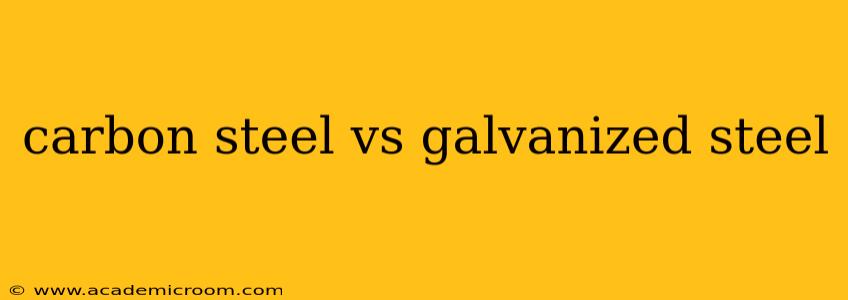Choosing the right steel for your project depends heavily on the application and its specific needs. Two popular choices often come into contention: carbon steel and galvanized steel. While both are strong and versatile, they possess distinct properties that make them better suited for different tasks. This comprehensive guide will delve into the key differences between carbon steel and galvanized steel, helping you make an informed decision.
What is Carbon Steel?
Carbon steel is an alloy primarily composed of iron and carbon. The carbon content, typically ranging from 0.05% to 2.1%, directly influences its properties. Higher carbon content generally means greater strength and hardness but reduced ductility (ability to be deformed without fracturing). Carbon steel is renowned for its strength, weldability, and machinability, making it a cost-effective choice for a wide array of applications. However, it's susceptible to rust and corrosion, especially in humid or wet environments.
What is Galvanized Steel?
Galvanized steel is carbon steel that has undergone a process called galvanization. This involves coating the steel with a protective layer of zinc. Zinc acts as a sacrificial anode, meaning it corrodes preferentially to the underlying steel, protecting it from rust and extending its lifespan significantly. The galvanization process can be done through hot-dip galvanizing or electro-galvanizing, each offering slightly different levels of protection.
Carbon Steel vs. Galvanized Steel: Key Differences
Here's a table summarizing the key differences:
| Feature | Carbon Steel | Galvanized Steel |
|---|---|---|
| Base Material | Iron and Carbon | Iron and Carbon (Zinc Coated) |
| Corrosion Resistance | Low | High |
| Strength | High (varies with carbon content) | High (similar to carbon steel) |
| Cost | Generally Lower | Generally Higher |
| Lifespan | Shorter (prone to rust) | Longer (protected from rust) |
| Maintenance | Requires regular maintenance | Requires less maintenance |
| Weldability | Excellent | Good (depends on galvanizing method) |
| Applications | Structures, machinery, tools | Fencing, roofing, automotive parts |
What are the applications of carbon steel?
H2: What are the applications of carbon steel?
Carbon steel's versatility makes it suitable for numerous applications. Its high strength and weldability make it ideal for construction projects, including building frames, bridges, and high-rise structures. It's also frequently used in the manufacturing of automobiles, machinery, tools, and various industrial components. Its machinability allows for precise shaping and fabrication, making it a preferred choice for many engineering applications.
What are the applications of galvanized steel?
H2: What are the applications of galvanized steel?
The enhanced corrosion resistance of galvanized steel makes it a preferred material for outdoor applications. Common uses include fencing, roofing, and other exterior building components. Its resistance to rust extends its lifespan, reducing the need for frequent replacements and maintenance. It’s also used in automotive parts, appliances, and other applications where corrosion protection is crucial.
How long does galvanized steel last?
H2: How long does galvanized steel last?
The lifespan of galvanized steel is significantly longer than that of carbon steel, largely due to the protective zinc coating. Under normal conditions, galvanized steel can last for several decades, even exceeding 50 years in some cases. However, the actual lifespan depends on several factors, including the environment (exposure to harsh chemicals or saltwater can reduce its lifespan), the thickness of the zinc coating, and the galvanizing method used.
Is galvanized steel stronger than carbon steel?
H2: Is galvanized steel stronger than carbon steel?
The strength of galvanized steel is comparable to that of carbon steel. The galvanization process doesn't significantly alter the steel's inherent strength. The added zinc layer adds minimal weight and doesn't compromise the structural integrity. The choice between the two should primarily be based on the need for corrosion resistance rather than strength considerations.
Which is better: carbon steel or galvanized steel?
H2: Which is better: carbon steel or galvanized steel?
There's no single "better" choice between carbon steel and galvanized steel. The optimal selection depends entirely on the specific application's requirements. If corrosion resistance is paramount, galvanized steel is the clear winner. However, if cost is a major factor and the application is in a dry environment with minimal exposure to moisture, carbon steel might be a more economical option. Carefully consider the project's demands, environmental factors, and budget before making your decision.
This detailed comparison provides a solid foundation for understanding the key differences between carbon steel and galvanized steel, enabling you to select the most appropriate material for your specific needs. Remember to consult with a professional engineer or metallurgist for complex projects or applications requiring specialized expertise.
